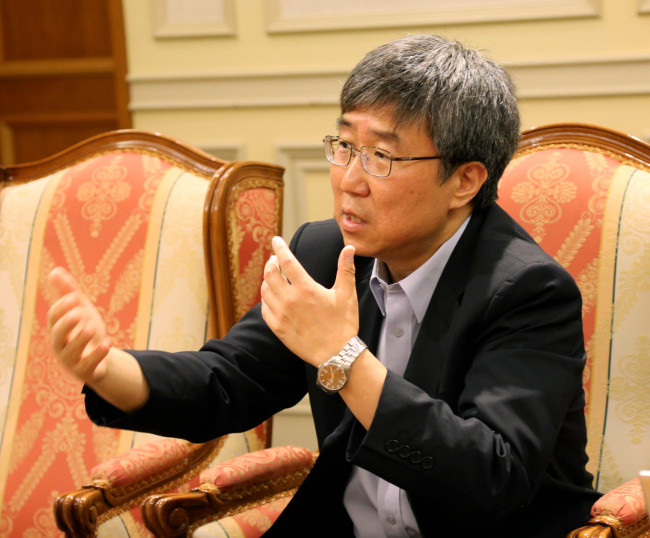[THE INVESTOR] JEJUDO ISLAND ㅡ To eke out a breakthrough in the current economic stalemate, Korean businesses and the country as a whole need to make bold choices about the future, embracing the risk of failure, Chang Ha-joon, the world-renowned Korean economist said.
“The industries that form the backbone of Korea’s economy now came to be as such in the ’70s, ’80s or ’90s at the latest. While those industries are now facing difficulties, challenged by latecomers, Korea has failed to make the leap to become a leader in new industries for the past two decades or so,” Chang, an economics professor at Cambridge University, said in a group interview with Korean media on the southern island of Jeju on Saturday.
“We don’t know what will work 30 or 40 years later, but companies and the government must make choices (from what looks promising now) and bet the future on them.”
“The industries that form the backbone of Korea’s economy now came to be as such in the ’70s, ’80s or ’90s at the latest. While those industries are now facing difficulties, challenged by latecomers, Korea has failed to make the leap to become a leader in new industries for the past two decades or so,” Chang, an economics professor at Cambridge University, said in a group interview with Korean media on the southern island of Jeju on Saturday.
“We don’t know what will work 30 or 40 years later, but companies and the government must make choices (from what looks promising now) and bet the future on them.”

According to his diagnosis, Asia’s fourth-largest economy is slowing due to a failure to find a new model of growth to replace the old one that brought Korea to a heroic economic rise.
Whatever the new model will be, it should be based on Korea’s core strength in manufacturing, Chang said, despite all the talk of the decline of Korean manufacturing.
“Manufacturing is like the engine of a vehicle. It may take up only 10 percent of the vehicle’s weight, but without it, the vehicle can’t run.”
Manufacturing is also where technological innovations mostly happen, the professor said.
“(Within the manufacturing,) there will be some (industrial sectors) to discard, the others to be upgraded. While doing this, Korea should refocus on research and development to prepare for the future,” he said.
The professor called for a fundamental change in the country’s approach to R&D.
“Because Korea was a trail follower, we were able to learn from those who had done it before. But now we have to chart our own course and decide ourselves where to put the money,” he said.
Like what the U.S. did to invest in research for computers and the Internet, Korea should approach R&D as a long-term investment and be willing to take a bet on the future.
“Korea is spending a lot on R&D, but we have to remember that in R&D, what matters really is the total amount.”
In 2014, Korea allocated 4.29 percent of gross national product to R&D projects, the highest rate in the world. But in terms of the amount, Korea’s was less than 30 percent of China’s spending, which was about 2 percent of its GDP.
Not just about the R&D policy, Korea needs a major shift in thinking about welfare, said the U.K.-based academic and author of “Bad Samaritans: The Guilty Secrets of Rich Nations and the Threat to Global Prosperity” and “23 Things They Don’t Tell You About Capitalism.”
Problems like a low birthrate and a high suicide rate, which is even higher among the elderly population, won’t be fixed by individual policy items, which almost always involve heated public debates and political bickering.
“A more fundamental approach is required, like a public consensus on taking on more tax burdens to have the nation provide the social safety net that was previously provided by the extended family system,” he said.
By Lee Sun-young / The Korea Herald (milaya@heraldcorp.com)





![[From the Scene] Monks, Buddhists hail return of remains of Buddhas](http://res.heraldm.com/phpwas/restmb_idxmake.php?idx=644&simg=/content/image/2024/04/19/20240419050617_0.jpg&u=20240419175937)





![[Graphic News] French bulldog most popular breed in US, Maltese most popular in Korea](http://res.heraldm.com/phpwas/restmb_idxmake.php?idx=644&simg=/content/image/2024/04/18/20240418050864_0.gif&u=)


![[From the Scene] Monks, Buddhists hail return of remains of Buddhas](http://res.heraldm.com/phpwas/restmb_idxmake.php?idx=652&simg=/content/image/2024/04/19/20240419050617_0.jpg&u=20240419175937)

![[KH Explains] Hyundai's full hybrid edge to pay off amid slow transition to pure EVs](http://res.heraldm.com/phpwas/restmb_idxmake.php?idx=652&simg=/content/image/2024/04/18/20240418050645_0.jpg&u=20240419100350)

![[Today’s K-pop] Illit drops debut single remix](http://res.heraldm.com/phpwas/restmb_idxmake.php?idx=642&simg=/content/image/2024/04/19/20240419050612_0.jpg&u=)